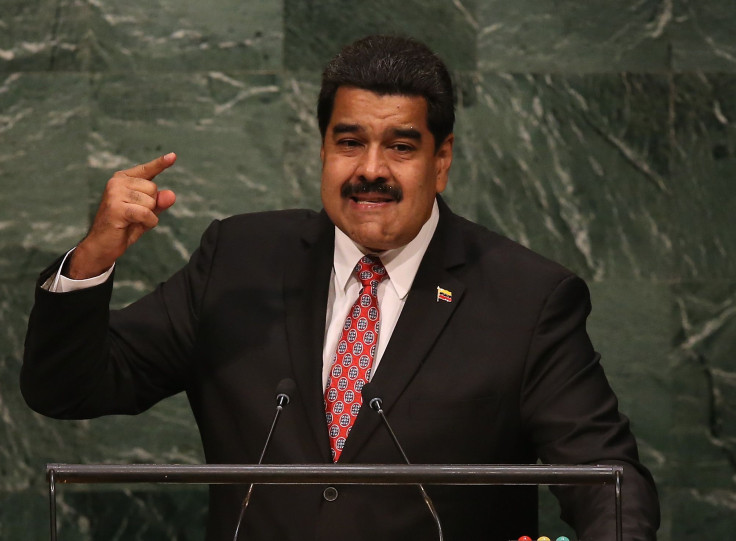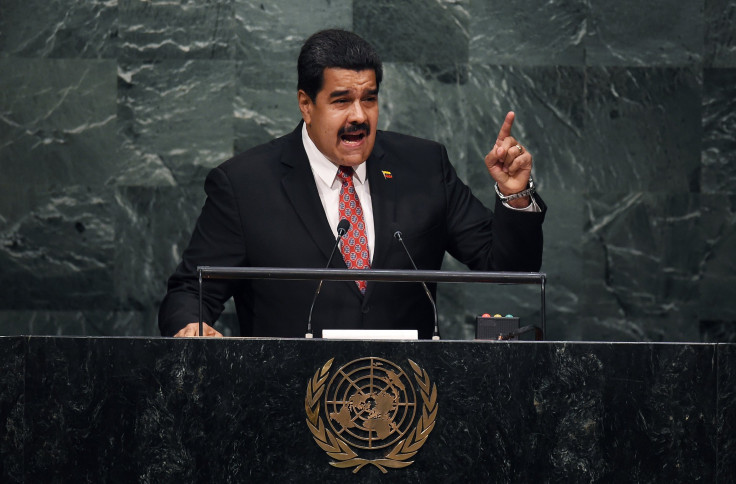Venezuela UN Speech 2015: 'Syria Is Like A Hollywood Version Of Terrorism'

Venezuelan President Nicolás Maduro Moros spoke on an array of issues at the United Nations General Assembly Tuesday, constantly coming back to the main theme of needing new, anti-imperialist politics. He called for the U.S. to end its embargo against Cuba as soon as possible and to vacate Guantanamo, criticized the wars in Iraq and Afghanistan, and urged negotiations to begin regarding the Falkland Islands.
Maduro began his speech referencing liberator Simon Bolivar’s Jamaica Letter, which rejected hegemony and the use of force. He then railed against the wars in Iraq and Afghanistan and called the war in Libya “a crime.”
"The war in Afghanistan, we have to ask ourselves about it. Did it bring peace? Did it build a situation of stability to the people of Afghanistan? No,” Maduro said.
As for the ongoing crisis in Syria, Maduro urged the U.N. to react, and said financing and arming from the West has only brought death and destruction.
"Syria is like a Hollywood version of terrorism. It's like a film version of the horrors of war,” Maduro said. “There has been financing and arming from the West, and this has led to death and destruction in Syria. And the people in Europe, there is a human tragedy, and the people in Europe feel it will affect them.”

Maduro then shifted his focus to issues in the Latin American region, and called for the normalization of relations between the U.S. and Cuba based on “respect and acknowledgment of who and what we are.” He advocated for the financial and economic U.S. blockade of Cuba to be lifted as soon as possible, and praised U.S. President Barack Obama for his “courage” in moving toward normalizing relations with Havana. Maduro then called for a dialogue between the United Kingdom and Argentina on the Falkland Islands, which was a topic Argentine President Cristina Kirchner left out of her speech.
Toward the end of his address, Maduro recognized the ongoing border dispute between Venezuela and neighboring Guyana. In contrast to Guyanese President David Granger’s statements about the border dispute earlier Tuesday, Maduro said the issue has been resolved through diplomacy.
Venezuela has long claimed 40 percent of Guyana’s territory, which is rich in natural resources including gold, bauxite and diamonds, the Associated Press reported. An international tribunal ruled in 1899 that mineral-rich region west of the Essequibo River belonged to Guyana, a ruling Venezuela has called unfair and refused to accept. Maduro withdrew his country's ambassador to Guyana in July after demanding to halt oil exploration by Exxon Mobil Corp. in the disputed area, Reuters reported. He also revoked accreditation for Guyana’s ambassador to Venezuela.
Prior to the U.N. General Assembly, Granger and Maduro met Sunday in New York to discuss the border dispute, teleSUR reported. At the meeting, the countries had agreed to restore diplomatic ties, but that did not stop Granger from blasting Maduro during his address to the U.N. Tuesday, saying Venezuela, “mindful of its superior wealth and military strength and unmindful of its obligation as a member state of the United Nations ... has pursued a path of intimidation and aggression."
© Copyright IBTimes 2024. All rights reserved.






















